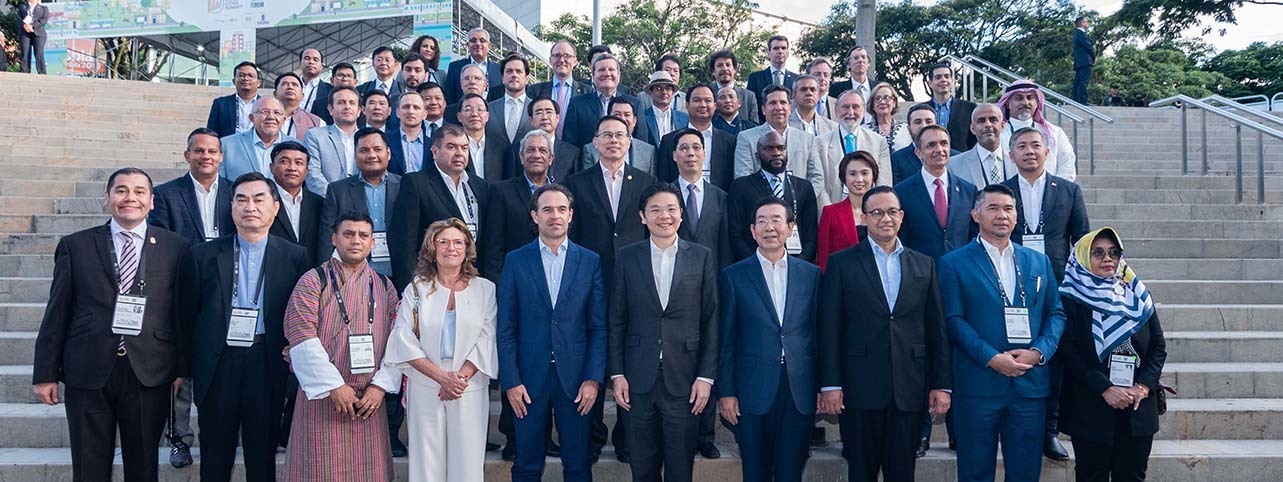Home >
About Us >
Past Editions >
Mayors Forum 2019
Mayors Forum 2019

Building a high trust city that is liveable and sustainable was the focus of the 10th World Cities Summit (WCS) Mayors Forum held in Medellín, Colombia, from 10–12 July 2019.
Around 270 participants, including 54 mayors and city leaders from 53 cities, discussed the latest innovations and good practices in city governance that help build confidence in urban societies and institutions, and how cities should plan for economic and environmental security in an age of unpredictable economic fluctuations and extreme weather events.
Delegates recognised that putting citizens at the heart of all government policies and ensuring their participation in governance was of utmost importance in building trust. They discussed how public spaces help in building trust by fostering social cohesion, generating social capital and improving security by bringing people together. In turn, high trust leads to the creation of more and better public spaces, thus setting off a virtuous cycle.
Mayors and city leaders issued a declaration pledging to work towards the shared vision of building high trust cities by empowering communities, building social capital and leveraging on adversity. They recognised that good governance and rule of law are the foundation for social and institutional trust, and that greater trust between citizens and the government is fostered when communities are empowered in the process of rebuilding cities.
Emphasising the need for tangible action to build trust and achieve results, the Forum’s Chairman and Singapore’s Minister for National Development and Second Minister for Finance, Lawrence Wong noted: “These actions should not be done in an ad hoc manner, but…as part of a coherent action plan, and articulated as part of a longer-term vision in a coherent and integrated manner”.
HOST CITY

Medellín, the 2016 Lee Kuan Yew World City Prize Laureate, was recognised for its success
in overcoming challenges of uncontrolled urban expansion and years of violence due to social inequalities and its remarkable transformation over the past two decades. Through bold leadership, long-term plans and social innovation, the city’s leaders have tackled its most pressing issues and improved the economy, as well as its citizens’ employability and quality of life.
YOUNG LEADERS SYMPOSIUM

Discussions at the WCS Young Leaders Symposium explored the latest innovations and good practices in city governance that help build confidence in urban societies and institutions, and how cities should plan for economic and environmental security.
At an interactive workshop, the Young Leaders shared how their endeavours have contributed to building trust in their cities, and lessons learnt from their personal experiences. A dialogue session with Minister Lawrence Wong focused on how Young Leaders can work more closely with the government to enhance economic, environmental and social confidence in cities.
KEY INSIGHTS FROM THEMATIC DISCUSSIONS
Session 1: Strengthening Social and Institutional Confidence

- Public confidence in a city’s society and institutions is vital for governments to carry out their duties and garner support for measures to ensure the wellbeing of citizens.
- Social, physical and institutional integration, when underpinned by dynamic urban governance and a long-term vision, can bridge divisions and build confidence.
- Putting citizens at the heart of all government policies and their participation in governance is of utmost importance in building trust.
- Ensuring physical and economic security and creating a culture of integrity and transparency in policymaking and implementation also builds confidence.
- Technology has a key role in facilitating citizen engagement and participation, enhancing security, delivering public services and in better deploying city resources.
- Public spaces also promote social cohesion and institutional trust, which in-turn can enable the creation of more and better public spaces such as parks, schools, healthcare facilities and transportation services.
Session 2: Enhancing Economic and Environmental Security

- Unpredictable economic cycles and extreme weather events are making long-term planning for economic and environmental security ever more important and complex.
- Cities must preserve and enhance their natural environment and prepare to cope with changing weather patterns and natural disasters, and to rebound from adversities.
- Cities need an inclusive economy that leaves no citizen behind and provides equal opportunities to achieve socially sustainable growth.
- Safety of citizens as well as food, water, energy and environmental security are equally important for people to feel assured that their habitat has a future.
- Housing is also an important source of security to citizens along with managing waste, mitigating floods and providing transportation services.
- Public parks that are accessible regardless of age and degrees of physical ability also help instil a sense of security.